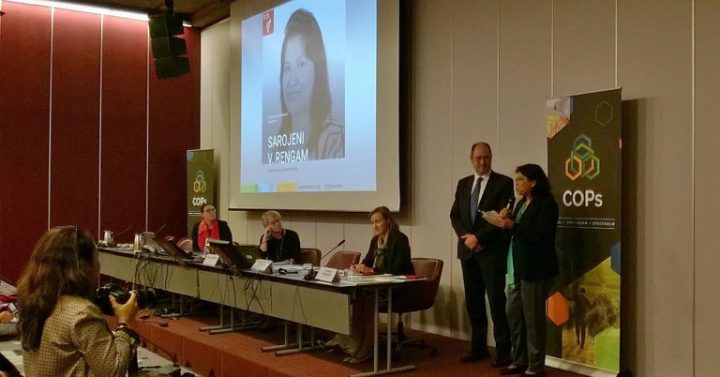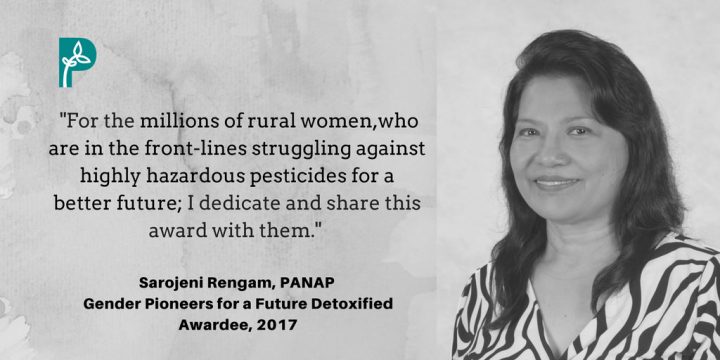For her efforts in championing women’s issues in various campaigns against toxic pesticides in the past 25 years, Ms. Sarojeni Rengam, Executive Director of Malaysia-based PAN Asia Pacific (PANAP), was recognized in the Conferences of the Parties (COPs) to the Basel, Rotterdam and Stockholm (BRS) Conventions on May 3, 2017 in Geneva, Switzerland.
Rengam was among the recipients of the ‘Gender Pioneers for a Future Detoxified’ award given by the BRS Conventions for distinguished advocates of advancing gender equality and mainstreaming gender issues in the area of chemicals and wastes.
In her speech accepting the award, Rengam acknowledged the millions of rural women on the ground that are in the frontlines of the struggle against highly hazardous pesticides in their daily lives as farmers, workers, and consumers.
“This recognition I dedicate to and share with them. This will serve as an inspiration for me to continue in my advocacy for women and the environment, for agroecology and food sovereignty, and for social justice,” Rengam said.
Ule Johanson, senior advisor for Development Cooperation, International Unit of Swedish Chemicals Agency (KEMI) who nominated Rengam for the award said, “We are very happy to hear that Ms. Rengam has received this award. Her long and persistent fight for human rights at all levels and in particular for rural women is noteworthy and makes her a perfect choice.”
Dr. Burnad Fathima Natesan of the Asian Rural Women’s Coalition (ARWC) said this is a proud moment for many rural women whose rights and interests Rengam has steadfastly fought for in PANAP’s campaigns, including on harmful pesticides and right to land and resources.
“The impact and awareness she has created in helping rural women understand the hazards of pesticide application in their fields and the impacts on one’s health, especially on women’s reproductive health, makes her the right person for this award,” Burnad said.
Burnad pointed out that Rengam has initiated a special program called Women and Agriculture in PANAP to study and look into the aspect of women’s land rights and to expose the role of corporations in promoting highly hazardous pesticides. “The rural women from India and from women’s movements in the region rejoice over this special moment,” said Burnad.
The PANAP official is known for her strong position on issues of women, farmers, farm workers, indigenous people and other marginalised rural sectors.
Glorene Amala, Executive Director of Tenaganita, a Malaysia-based advocacy group working with migrants, refugees and women, described Rengam as an “embodiment of women empowerment”. She continues to inspire women through her leadership by building women’s resistance against pesticides and chemicals through many programs and activities nationally, regionally and at the global level,” Amala said.
Situations change when people are informed and empowered.
“To make things change you have to educate and empower people. To improve farming conditions and reduce the negative impact of pesticide use you have to collect evidence of malpractice and cases of people getting hurt. Rengam has done all of this, and year by year conditions start to improve,” said KEMI’s Ule.
Amala added, “Her (Rengam’s) work has brought about tremendous changes in the lives of those who have been affected with pesticides and chemicals as she led many of them in global actions and movement on environment issues, food security and sovereignty, and women’s rights over land and productive resources.”

Based in Switzerland, the BRS Conventions are multilateral environmental agreements that aim to protect human health and the environment from hazardous chemicals and wastes. The “Gender Pioneers for a Future Detoxified” award is part of its activities on gender equality.
###








Discussion about this post